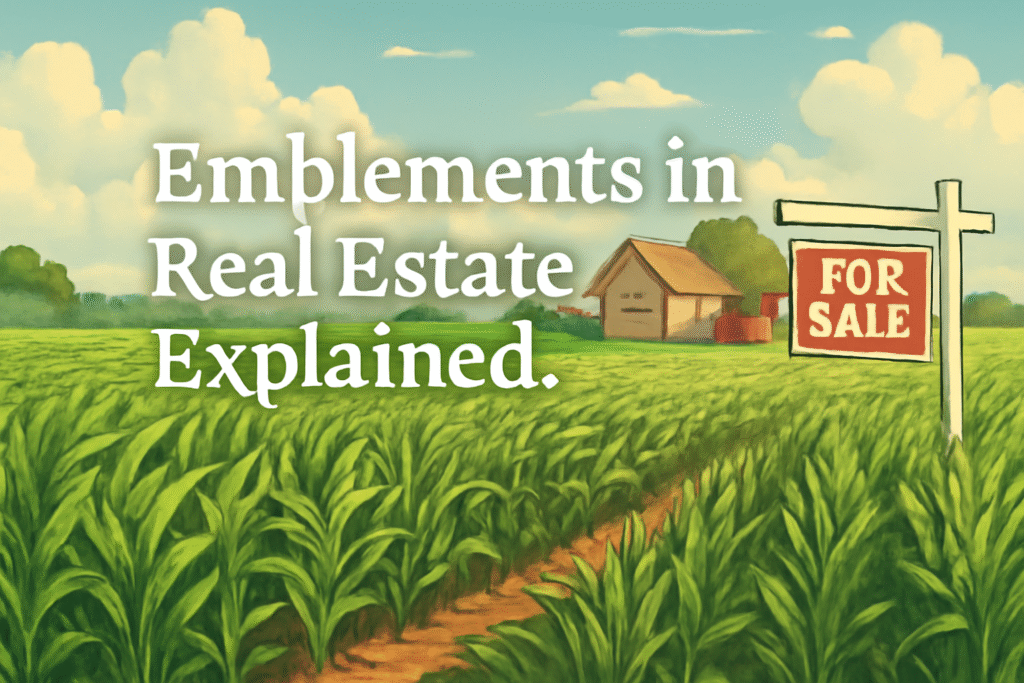Emblements in real estate refer to crops that are grown annually and require human labor and cultivation to thrive. These crops are legally considered personal property, not part of the land itself. This distinction matters because if land ownership changes, tenants who planted the crops may still have the right to harvest them.
The term typically applies to crops like wheat, corn, soybeans, and vegetables—essentially, anything requiring seasonal replanting. Unlike naturally growing trees or perennial plants, emblements represent the effort and investment of the cultivator, which is why laws often protect their interests.
Legal Definition of Emblements in Real Estate
From a legal perspective, emblements are defined as annual crops cultivated by a tenant on leased land, which the tenant has the right to harvest even after lease termination, provided the lease ended unexpectedly. This means that if a farmer leases land and plants crops, then loses the lease due to the owner’s decision or death, the tenant can still legally return to harvest the crops they sowed.
This doctrine emphasizes fairness, recognizing the tenant’s labor and financial risk. However, the rules vary by jurisdiction, and contracts often override common law principles regarding emblements.
Origins of Emblements in Property Law
The concept of emblements dates back to English common law. Historically, agricultural production was central to the economy, and disputes frequently arose between landlords and tenants over crop ownership. To resolve these conflicts, courts developed the principle of emblements, granting tenants rights to their crops even if the lease ended prematurely.
This rule balanced property rights by protecting landowners’ control over land while safeguarding tenants’ investments. Today, the same principle continues to influence modern real estate law, especially in rural and agricultural leases.
Emblements in Farming Leases
For farmers leasing land, emblements are crucial. If a tenant plants corn in March and the landlord unexpectedly sells the land in July, the tenant retains the right to harvest the corn come October. Without this doctrine, tenants would risk losing their entire investment whenever property ownership changed.
However, if the lease specifies that crops belong to the landowner, then contractual terms may override common law protections. This highlights the importance of reviewing lease agreements carefully.
How Crops Affect Ownership Rights
The key question is whether crops are part of the land (real property) or belong to the person who planted them (personal property). Emblements establish that annual crops are personal property of the planter, not fixtures of the land. This distinction affects:
-
Sales of land – Buyers may not automatically own growing crops.
-
Lease terminations – Tenants may still harvest crops after leaving.
-
Inheritance laws – Heirs may need to honor emblement rights of tenants.
This makes crop rights a central issue in many property transfers.
Cash Crops vs. Perennial Crops
Not all crops qualify as emblements.
-
Cash crops such as corn, rice, and soybeans are considered emblements because they require replanting each year.
-
Perennial crops such as apple trees, grapevines, and timber are considered part of the land itself.
If a tenant plants fruit trees, they generally cannot claim ownership after leaving, because those trees are fixtures of the property.
Rights of Tenants Regarding Emblements
Tenants are often at the heart of emblements disputes. Their rights usually include:
-
Returning to harvest crops they planted before losing possession.
-
Claiming the economic value of the harvest even if the land is sold.
-
Protection from losing their investment due to unforeseen lease termination.
However, tenants may lose emblement rights if they abandon the property voluntarily or if the lease specifies otherwise.
When Tenants Can Claim Emblements
Tenants may claim emblements when:
-
The lease ends unexpectedly due to the landlord’s actions.
-
The landlord dies and heirs inherit the land.
-
The property is sold before crops are harvested.
Tenants usually cannot claim emblements if the lease naturally expires, because they should have known the lease term when planting.
Tenant-Owner Disputes Over Emblements
Disputes typically arise when landlords believe crops belong to the land, while tenants argue they should be allowed to harvest. Courts often side with tenants if the crops qualify as emblements, but disputes may also involve damages, lost profits, or property trespass claims.
Mediation and clear contracts are the best way to avoid prolonged legal battles.
Emblements in Landlord-Tenant Agreements
To avoid conflicts, landlords and tenants often include emblements clauses in lease agreements. These clauses specify:
-
Who owns the crops at the end of the lease
-
Whether tenants can return to harvest after termination
-
Compensation methods if disputes arise
By defining these terms in writing, both parties reduce uncertainty.
How Landlords Protect Their Property Interests
Landlords may protect themselves by:
-
Requiring tenants to harvest before leaving
-
Retaining ownership rights to all crops in the lease
-
Prohibiting tenants from planting late in the lease term
These measures prevent future disputes and ensure landlords maintain control over their property.
Handling Lease Terminations and Emblements
When leases end unexpectedly, both parties need to address:
-
Timing of harvests
-
Access to land for harvesting
-
Division of profits, if applicable
Courts generally allow reasonable access for tenants to gather crops but discourage long-term occupation after lease termination.
Emblements in Sale of Land
When property is sold, buyers may assume they own everything on the land, including crops. However, emblements law protects tenants’ rights to harvest crops they planted. Buyers must honor these rights, though they may negotiate compensation or accelerated harvests.
This is why real estate agents often include crop ownership discussions in agricultural property sales.
What Happens to Crops After Property Sale
Depending on the situation:
-
If planted by the owner, crops transfer to the buyer.
-
If planted by a tenant, crops remain with the tenant.
-
If no agreement exists, courts apply common law emblements principles.
This ensures fairness in transactions.
Emblements in Inheritance and Estate Law
When landlords pass away, their heirs inherit the land but not necessarily the crops. Tenants who planted crops before the landlord’s death usually retain the right to harvest them.
Estate planners must consider emblements when handling farmland, as crop rights can significantly affect estate value.
Emblements and Contract Clauses
Modern real estate contracts often override common law by explicitly stating crop ownership. For example:
-
“All crops belong to the landlord upon lease termination.”
-
“Tenant retains rights to harvest crops even after lease ends.”
Such clauses prevent legal disputes and reflect the intentions of both parties.
How Courts Interpret Emblements
Courts generally interpret emblements to favor tenants when leases end unexpectedly. Judges emphasize fairness, especially when tenants invested time and money. However, they also respect contract clauses, meaning written agreements often prevail over traditional common law.
Notable Legal Cases Involving Emblements
Several court cases have shaped emblements law. For example:
-
Cases where tenants were allowed to harvest after foreclosure.
-
Disputes where tenants lost emblements rights due to voluntary abandonment.
-
Landmark rulings distinguishing between perennial and annual crops.
These cases serve as precedents for future disputes.
Emblements in Foreclosure Situations
When banks foreclose on agricultural land, tenants may still retain rights to harvest crops. Courts often rule that foreclosure does not negate tenant rights to emblements, provided the lease was valid before foreclosure.
This protection shields tenants from losing income due to circumstances beyond their control.
Emblements in Eminent Domain
If the government takes land for public use, tenants may claim compensation for emblements. Compensation usually covers:
-
The value of crops planted but not yet harvested
-
Lost profits from anticipated yields
This ensures tenants are not left uncompensated for their investment.
How Emblements Affect Real Estate Transactions
Real estate agents, buyers, and sellers must consider emblements when transferring farmland. Failure to address crop rights can lead to costly disputes, delayed closings, and even lawsuits.
Contracts should always clarify who owns crops at the time of sale.
Economic Value of Emblements
Crops represent significant financial value, especially for cash crops like corn and soybeans. Emblements laws protect this value by ensuring tenants do not lose income due to unexpected property changes.
In some cases, the value of emblements may even exceed the rental value of the land itself.
Insurance Coverage for Emblements
Crop insurance often covers emblements, protecting farmers from natural disasters, drought, or market fluctuations. Landlords and tenants should verify whether policies cover unharvested crops at the time of lease termination.
Taxation Issues with Emblements
Emblements are generally taxed as personal property income for the tenant who harvests them. However, property owners may also face tax implications depending on the terms of the lease. Tax professionals often assist in navigating these complex rules.
Emblements in Commercial Real Estate
While traditionally linked to farmland, emblements also affect commercial real estate. For instance, greenhouse operations, specialty crop farms, and urban agriculture leases often include emblement clauses.
This highlights the continuing relevance of emblements in modern property law.
Impact of Technology on Emblements
Technology, including precision farming, drones, and automated irrigation, affects emblements by increasing crop value and investment. As costs rise, tenant protections become even more important to safeguard financial risk.
Future of Emblements in Property Law
With climate change, urban farming, and evolving lease structures, emblements will continue to play a role in property disputes. Future laws may further refine crop ownership rights in complex real estate transactions.
Emblements vs. Fixtures in Real Estate
Fixtures are items permanently attached to land, such as barns or irrigation systems. Unlike fixtures, emblements are temporary and tied to seasonal planting. This distinction clarifies why crops can remain personal property, while buildings stay with the land.
Emblements vs. Trade Fixtures
Trade fixtures are equipment used in business (like restaurant ovens). Just as tenants may remove trade fixtures at lease end, they may also claim emblements. Both doctrines protect tenant investments.
How Emblements Differ from Easements
Easements are long-term rights to use land (like pathways or utility access). Emblements, in contrast, deal with short-term rights to harvest crops. Both are legal rights but apply in very different contexts.
Risks of Disputes over Emblements
Disputes often arise when:
-
Contracts fail to address crop ownership.
-
Property changes hands unexpectedly.
-
Landlords and tenants disagree over timing of harvests.
These risks make legal clarity essential.
Environmental Factors Affecting Emblements
Droughts, floods, and soil conditions can destroy emblements, complicating disputes. Contracts may need force majeure clauses to address natural disasters affecting crop rights.
Mitigating Risks Through Contracts
The best way to avoid emblements disputes is through clear contracts that specify crop ownership, harvest rights, and compensation. Lawyers often draft detailed clauses to prevent misunderstandings.
Real-Life Disputes Over Emblements
In practice, disputes may involve:
-
A tenant claiming crops after foreclosure.
-
Landlords demanding profits from crops planted during lease.
-
Buyers refusing to honor tenant crop rights.
Each case underscores the importance of clear agreements.
Famous Examples in Real Estate Law
Several high-profile cases have shaped emblements law, reinforcing tenant protections and clarifying the definition of annual crops. Legal scholars often cite these cases in modern property disputes.
Lessons Learned from Emblements Cases
The key lesson is simple: clarity prevents conflict. Whether through contracts, negotiations, or mediation, defining emblements rights upfront avoids costly disputes later.
Also read :Summit Credit Union CD Rates: Expert Insights for Savvy Investors
FAQs
What are emblements in real estate?
Emblements are annual crops that tenants may harvest even after lease termination, provided the lease ended unexpectedly.
Do buyers automatically get crops when buying farmland?
Not always. If a tenant planted the crops, the tenant usually retains harvesting rights under emblements law.
Are fruit trees considered emblements?
No. Perennial plants like fruit trees and vines are part of the land, not emblements.
Can landlords prevent tenants from claiming emblements?
Yes, but only if the lease explicitly states that crops belong to the landlord.
Do tenants keep emblements after foreclosure?
Often, yes. Courts typically protect tenants’ rights to harvest crops they planted before foreclosure.
How do emblements affect inheritance?
If a landowner dies, heirs inherit the land, but tenants usually retain rights to harvest crops planted before the death.
Conclusion
Emblements in real estate represent a fascinating intersection of law, agriculture, and property rights. They protect tenants from unfair losses, ensure landlords maintain control, and clarify ownership in complex transactions. While rooted in centuries-old common law, emblements remain highly relevant in modern farming, leasing, and real estate sales.
Whether you are a landowner, tenant, or buyer, understanding emblements is essential to avoiding disputes and safeguarding investments. By addressing crop ownership upfront in contracts, all parties can ensure fairness, clarity, and peace of mind.



